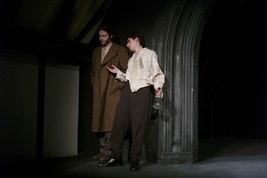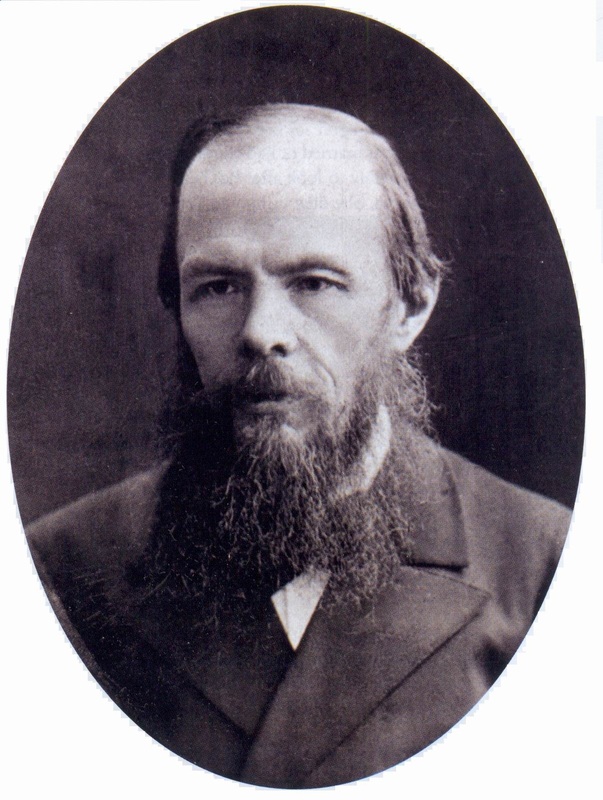
The last section of the book Crime and Punishment contained a lot of suspense. Now that the murders have been committed and Raskolnikov was able to walk away without being noticed, we get to move on to the next part of the book. The following chapters of Crime and Punishment now contain a lot of verbal, situational, and dramatic irony. Before Raskolnikov killed Alena and Lizaveta Ivavovna, the book talked about how he was beginning to feel feverish. After the killings, Raskolnikov's fever begins to get worse and worse. When Raskolnikov got home the night that he murdered the women, he was in an extreme sense of paranoia, and felt that he would get caught at any moment. He ended up falling asleep, and not waking up until the next day around noon. Nastasya, the 'housemaid', came in and woke him up, and also told him that he was wanted at the police station. Of course, this news strikes a nerve in Raskolnikov. When Raskolnikov arrives at the police station, he is scolded for the about his debt. However, while he is there, he finds himself arguing with a lieutenant. During this argument, Raskolnikov makes the statement "'Poverty is no crime...'", which is verbal irony because he has just murdered two women, and was motivated by money. After a while, Raskolinkov leaves the police station and goes back home. Once he is there, he starts to feel paranoid about the objects that he stole again. So, Raskolnikov decided to go for a walk and find some place to get rid of them. At first, Raskolnikov wants to throw them in a river, but then realizes that the small items might float instead of sink. Soon enough, Raskolnikov encounters a waste land that was fenced off. He finds a large boulder that had a small hole underneath where he was able to hide the items. Before Raskolnikov committed the murders, he wasn't anxious and paranoid. However, ever since he decided to go through with his plans, he has been in an odd state of mental health. The quote "'This would be a place to throw the things and get away', he thought at once" contains symbolism for his anxiety and paranoia. Raskolnikov feels that once he gets rid of the objects, everything will be ok for him. The objects could symbolize his anxiety and the dump could symbolize him getting rid of his worries.
When Raskolnikov leaves the dump, he goes to visit his friend Razumikhin. However, When Raskolnikov arrives at his house, he suddenly feels angry and does not want to speak to Razumikhin. Raskolnikov ends up leaving Razumikhin's house abruptly. On his way home, Raskolnikov is given a handful of money after being mistaken for being a bum. "He unclasped his hand and stared at the money, then flung it into the water with a sweep of the arm; then he turned away and walked homewards." This quote suggests that Raskolnikov's constent acts of getting rid of money could be a motif in this story. By the time Raskolnikov gets home, he is so sick and feverish that he ends up passing out. He stayed in a coma for a couple of days, and when he finally awaoke, there was a crowd of people in his apartment, which consisted of a doctor, Nastasya, Razumikhin, and Zametov. This group of people talk to Raskolnikov about who they think murdered the women, how it happened, what Raskolnikov said while he was delirious, and a letter that was sent to him. Much of the converstaion they had was ironic because Raskolnikov was the one who killed the women, but they had their own theories about what happened and who did it.
When Raskolnikov leaves the dump, he goes to visit his friend Razumikhin. However, When Raskolnikov arrives at his house, he suddenly feels angry and does not want to speak to Razumikhin. Raskolnikov ends up leaving Razumikhin's house abruptly. On his way home, Raskolnikov is given a handful of money after being mistaken for being a bum. "He unclasped his hand and stared at the money, then flung it into the water with a sweep of the arm; then he turned away and walked homewards." This quote suggests that Raskolnikov's constent acts of getting rid of money could be a motif in this story. By the time Raskolnikov gets home, he is so sick and feverish that he ends up passing out. He stayed in a coma for a couple of days, and when he finally awaoke, there was a crowd of people in his apartment, which consisted of a doctor, Nastasya, Razumikhin, and Zametov. This group of people talk to Raskolnikov about who they think murdered the women, how it happened, what Raskolnikov said while he was delirious, and a letter that was sent to him. Much of the converstaion they had was ironic because Raskolnikov was the one who killed the women, but they had their own theories about what happened and who did it.

 RSS Feed
RSS Feed